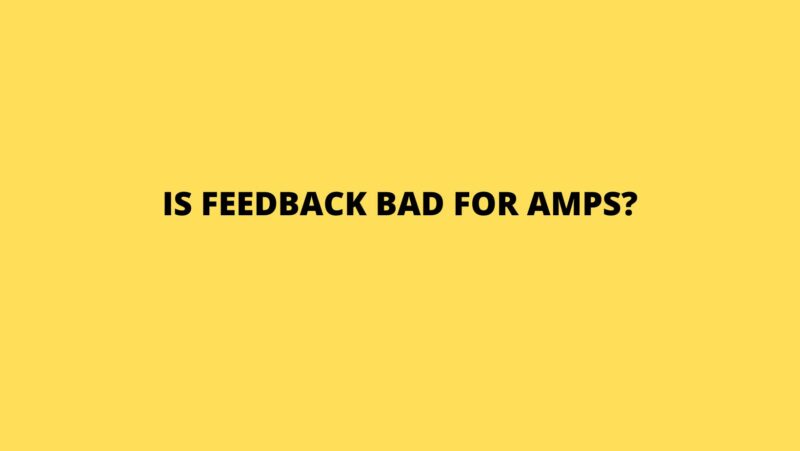Amplifiers stand as the lifeblood of musical expression, transforming the subtle vibrations of instruments into captivating soundscapes. However, a persistent concern that lingers in the minds of musicians and audio enthusiasts is the relationship between feedback and amplifiers. The haunting screech of feedback can be unsettling, leaving us to wonder: is feedback truly detrimental to our beloved amplifiers? In this article, we embark on a journey to unravel the science behind feedback, dissect its true impact on amplifiers, and decipher whether it is as ominous as it seems.
Feedback 101: The Dynamics
Feedback, within the realm of audio amplification, occurs when sound from the amplifier’s output is picked up by the instrument or microphone and subsequently reintroduced into the system, creating a self-perpetuating loop that can amplify specific frequencies to distortion levels. While feedback can be an auditory annoyance, its potential to harm amplifiers is a topic that merits closer examination.
Amplifier Anatomy and Function
To dissect the connection between feedback and amplifiers, it’s essential to comprehend the inner workings of these devices. Amplifiers amplify the input signal—your instrument’s sound—by boosting its power to create a resonant output that fills the auditory space. This process involves various electronic components, such as transistors, tubes, capacitors, and resistors, working harmoniously to produce the final sound.
The Feedback Myth: Impact on Amplifiers
Contrary to popular belief, feedback itself is not inherently damaging to amplifiers. The sound loop created by feedback does not directly result in the destruction of amplifier components. Instead, it’s the implications of feedback that may indirectly affect amplifiers over time. Here are a few points to consider:
- Component Stress: While feedback doesn’t immediately damage components, the frequencies amplified through the loop can stress certain components, like tubes or transistors. Continuous stress over time can potentially lead to accelerated wear and deterioration of these components.
- Temperature Rise: Excessive feedback can increase the workload on amplifier components, resulting in elevated temperatures within the device. While most amplifiers are designed to handle heat, prolonged exposure to heightened temperatures may contribute to component aging.
- Speaker Strain: Feedback-induced vibrations can strain amplifier speakers. Repetitive exposure to certain frequencies can lead to physical wear and, in extreme cases, distortion or damage to the speaker cone.
- Performance Impact: Prolonged feedback-induced distortion and clipping can result in higher demands on the amplifier to produce desired sounds. This prolonged stress can potentially contribute to component degradation.
Separating Myth from Reality: Feedback Prevention
- Address Feedback at Its Origin: The most effective strategy to prevent potential amplifier issues is to address feedback before it becomes problematic. Employ techniques like instrument and amplifier positioning, microphone placement, EQ adjustments, and sound checks to manage feedback and avoid prolonged exposure.
- Utilize Built-in Features: Some modern amplifiers are equipped with built-in features like limiters and automatic feedback suppression systems. These tools can aid in controlling levels and mitigating any potential damage resulting from feedback.
- Regular Maintenance: To ensure the longevity of your amplifier, prioritize regular maintenance. Regular inspections, component cleaning, and addressing any issues arising from feedback can significantly contribute to the overall health of your amplifier.
Conclusion
Feedback, in isolation, is not the amplifier’s nemesis. While the loop created by feedback can stress components and lead to potential implications over time, it’s not a direct amplifier killer. Amplifiers are designed to withstand a degree of stress and heat, and while feedback can contribute to these factors, it is not the sole culprit. The most effective defense against potential amplifier issues lies in proactive prevention. By addressing feedback at its root and utilizing available features and strategies, musicians can enjoy the power and resonance of amplification without succumbing to the perceived threats of excessive feedback. Regular maintenance and a conscious approach to performance will further contribute to the longevity and vitality of your amplifier. In the grand symphony of sound, the harmony between feedback and amplification can be achieved through knowledge, technique, and care.


